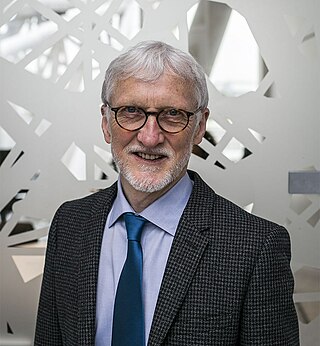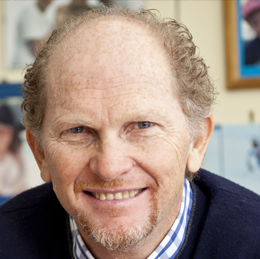Related Research Articles

Walter Jakob Gehring was a Swiss developmental biologist who was a professor at the Biozentrum Basel of the University of Basel, Switzerland. He obtained his PhD at the University of Zurich in 1965 and after two years as a research assistant of Ernst Hadorn he joined Alan Garen's group at Yale University in New Haven as a postdoctoral fellow.

The San Raffaele Hospital is a university hospital situated in Segrate, the Province of Milan, Italy. It was founded in 1969 by don Luigi Maria Verzé, president of "San Raffaele del Monte Tabor Foundation". The facility is connected to the Milan Metro by the MeLA people mover.
Sir Michael John Berridge was a British physiologist and biochemist.

Pascale Cossart is a French bacteriologist who is affiliated with the Pasteur Institute of Paris. She is the foremost authority on Listeria monocytogenes, a deadly and common food-borne pathogen responsible for encephalitis, meningitis, bacteremia, gastroenteritis, and other diseases.

Established in 1986, the Louis-Jeantet Prizes are funded by the Fondation Louis-Jeantet and awarded each year to experienced researchers who have distinguished themselves in the field of biomedical research in one of the member states of the Council of Europe. They are not intended solely as the recognition of work that has been completed, but also to encourage the continuation of innovative research projects. The prizes are awarded to fully active researchers whose scientific efforts are focused on biomedical research. When the research being recognised is close to practical applications for combating illnesses affecting humankind, one of the Louis-Jeantet Prizes converts into a Jeantet-Collen Prize for Translational Medicine, supported by generous donations from the Désiré Collen Stichting.

Denis Duboule is a Swiss-French biologist. He earned his PhD in Biology in 1984 and is currently Professor of Developmental Genetics and Genomics at the École polytechnique fédérale de Lausanne (EPFL) and at the Department of Genetics and Evolution of the University of Geneva. Since 2001, he is the Director of the Swiss National Research Center "Frontiers in Genetics" and since 2017, he is also a professor at the Collège de France. He has notably worked on Hox genes, a group of genes involved in the formation of the body plan and of the limbs.
In 1992 Doctor Claudio Bordignon working at the Vita-Salute San Raffaele University, Milan, Italy performed the first procedure of gene therapy using hematopoietic stem cells as vectors to deliver genes intended to correct hereditary diseases. This was a world first, but was unfortunately unsuccessful because it did not lead to sustained correction of the hematopoietic stem cells. In 2002 this work led to the publication of the first successful gene therapy treatment for adenosine deaminase deficiency (SCID). He expanded this work to stem cell gene therapy of other genetic diseases and AIDS, and for the immunotherapy of cancer.

Silvia Arber is a Swiss neurobiologist. She teaches and researches at both the Biozentrum of the University of Basel and the Friedrich Miescher Institute for Biomedical Research in Basel Switzerland.

Emmanuelle Marie Charpentier is a French professor and researcher in microbiology, genetics, and biochemistry. As of 2015, she has been a director at the Max Planck Institute for Infection Biology in Berlin. In 2018, she founded an independent research institute, the Max Planck Unit for the Science of Pathogens. In 2020, Charpentier and American biochemist Jennifer Doudna of the University of California, Berkeley, were awarded the Nobel Prize in Chemistry "for the development of a method for genome editing". This was the first science Nobel Prize ever won by two women only.

Iain William Mattaj FRS FRSE is a British scientist and Honorary Professor at Heidelberg University in Germany. From 2005 to 2018 he was Director General of the European Molecular Biology Laboratory (EMBL). He stepped down from the position at the end of 2018 following his appointment to Human Technopole. In January 2019 he took office as the first Director of Human Technopole, the new Italian institute for life sciences in Milan, Italy.
Sir Hugh Reginald Brentnall Pelham, is a cell biologist who has contributed to our understanding of the body's response to rises in temperature through the synthesis of heat shock proteins. He served as director of the Medical Research Council (MRC) Laboratory of Molecular Biology (LMB) between 2006 and 2018.
Autologous CD34+ enriched cell fraction that contains CD34+ cells transduced with retroviral vector that encodes for the human ADA cDNA sequence, sold under the brand name Strimvelis, is a medication used to treat severe combined immunodeficiency due to adenosine deaminase deficiency (ADA-SCID).

Andrea Ballabio, M.D., is an Italian scientist and academic professor. He is director of the Telethon Institute of Genetics and Medicine (TIGEM) of Pozzuoli; professor of medical genetics at the Federico II University of Naples and visiting professor of genetics at Baylor College of Medicine in Houston, Texas, US and at the University of Oxford-UK.
Elena Conti is an Italian biochemist and molecular biologist. She serves as Director and Scientific Member of the Max Planck Institute of Biochemistry in Martinsried, Germany, where she uses structural biology and biophysical techniques to study RNA transport and RNA metabolism. Together with Elisa Izaurralde, she helped characterize proteins important for exporting mRNA out of the nucleus.

Sir Richard Henry Treisman is a British scientist specialising in the molecular biology of cancer. Treisman is a director of research at the Francis Crick Institute in London.

Giuseppe Merla is an Italian scientist who is a Full Professor of Molecular Biology at University of Naples Federico II and medical geneticist at Casa Sollievo della Sofferenza in San Giovanni Rotondo, Italy. He is the Managing Director of Fondazione Telethon-Genomic and Genetics Disorders Biobank, a member of EuroBioBank at the Casa Sollievo della Sofferenza Hospital. Merla and his team led the discovery of a new rare genetic syndrome intellectual development disorder with cardiac arrhythmia and the gene responsible for it. Merla is also known for his extensive research on Kabuki Syndrome. He has been declared as the Ambassador of Kabuki syndrome and received the 2019 Ambassador Day award at the Royal Villa of Monza.

Michele 'Miki' De Palma is an Italian biologist and a professor at EPFL. He is known for his work on the role of macrophages in cancer progression and the discovery of Tie2-expressing angiogenic monocytes.

Didier Trono was a Swiss virologist and a professor at the École Polytechnique Fédérale de Lausanne (EPFL). He was known for his research on virus-host interactions and the development of lentiviral vectors for gene therapy.
Maria Grazia Roncarolo is an Italian pediatrician who is currently George D. Smith Professor in Stem Cell and Regenerative Medicine and Professor of Medicine at Stanford University. She is also the Director of the Stanford Institute of Stem Cell Biology and Regenerative Medicine along with Irving Weissman and Michael Longaker and the Director for Center for Definitive and Curative Medicine at Stanford.

Jan Hendrik Jozef Hoeijmakers is a Dutch molecular biologist, biochemist, and molecular geneticist.
References
- 1 2 https://www.genenta.com/leadership/
- 1 2 3 4 "Luigi Naldini". Università Vita-Salute San Raffaele (hsr.it).
- 1 2 https://chromamedicine.com/team/?term=founders
- ↑ https://research.hsr.it/en/news/the-2019-louis-jeantet-prize-awarded-to-luigi-naldini.html#:~:text=Luigi%20Naldini%2C%20director%20of%20the,bedside%2C%20allowing%20to%20treat%20several
- ↑ https://www.genespire.com/en/about-us/founders/
- 1 2 3 4 5 6 7 https://research.hsr.it/en/institutes/san-raffaele-telethon-institute-for-gene-therapy/gene-transfer-technologies-and-new-gene-therapy-strategies/luigi-naldini.html
- 1 2 https://www.esgct.eu/post/2015-awards-winners
- ↑ https://www.jeantet.ch/en/prix-louis-jeantet/laureats/2019-en/
- 1 2 3 https://www.jeantet.ch/en/prix-louis-jeantet/laureats/2019-en/luigi-naldini/
- ↑ https://www.thefutureofscience.org/speakerdetail/sixth-world-conference-on-the-future-of-science-viruses-the-invisible-enemy-naldini-luigi-295
- ↑ https://www.ncbi.nlm.nih.gov/books/NBK447259/
- ↑ https://www.telethon.it/cosa-facciamo/ricerca/ricercatori/luigi-naldini
- ↑ https://www.lincei.it/it/content/naldini-luigi
- ↑ https://www.eyeofriyadh.com/news/details/inaugural-global-health-pioneer-awards-launched-in-dubai
- ↑ http://tradearabia.com/news/HEAL_350282.html
- ↑ http://wam.ae/en/details/1395302735400
- ↑ https://www.hematology.org/awards/honorific/ernest-beutler-lecture-prize-recipients
- ↑ https://www.fondazionesanraffaele.it/news/assegnato-al-prof-naldini-il-premio-capitani-dellanno-2016/
- ↑ https://www.telethon.it/storie-e-news/news/dalla-fondazione/a-luigi-naldini-il-jimenez-diaz-prize-2016/
- ↑ https://www.fundacionconchitarabago.net/lecci%C3%B3n-conmemorativa
- ↑ https://www.unisr.it/en/docenti/n/naldini-luigi
- ↑ https://www.ncbi.nlm.nih.gov/books/NBK447272/
- ↑ https://www.accademiadellescienze.it/premio-Gili-Agostinelli
- ↑ https://asgct.org/membership/grants-awards/outstanding-achievement-award
- ↑ https://people.embo.org/profile/luigi-naldini